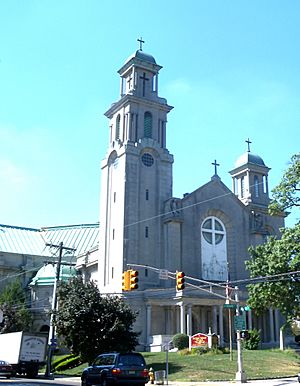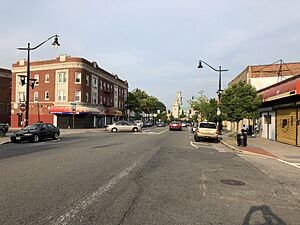Vailsburg, Newark facts for kids
Vailsburg is a neighborhood in the city of Newark, located in Essex County, New Jersey. It's part of Newark's West Ward and sits on a hill about 280 feet high. In 2000, Vailsburg had a population of 34,348 people. This area is unique because it's on a hill that connects closely to the nearby suburban towns and parks. Vailsburg is divided into two smaller parts: Upper Vailsburg and Lower Vailsburg. Both areas have Sanford Avenue as a main street. Upper Vailsburg is closer to towns like Maplewood and South Orange.
Contents
Vailsburg's Past
Vailsburg used to be its own separate town! It became an official "borough" (a type of small town) on March 28, 1894. This happened when it separated from parts of South Orange Township. However, Vailsburg later joined Newark on January 1, 1905, after people voted for it on April 12, 1904. The borough was named after Dr. Merit H. Cash Vail. He was a doctor and a politician who owned a lot of land and strongly supported Vailsburg becoming its own town.
Vailsburg was the last independent suburb to join Newark in 1905. Today, Vailsburg stands out from the rest of Newark almost like a peninsula. It's separated from the main part of the city by the deep cut of the Garden State Parkway highway.
Vailsburg Today
Vailsburg has many homes built between 1945 and 1947. These houses often have designs inspired by Dutch Colonial and Victorian styles. Upper Vailsburg mostly has single-family homes, while Lower Vailsburg has both single-family and two-family houses. The area is also home to the Ivy Hill Apartments, which is the largest rental complex in New Jersey. While some parts of Vailsburg show signs of needing repair, many areas have well-kept homes and streets, giving them a suburban feel.
The main shopping streets, especially South Orange Avenue, were improved around the year 2000. Many businesses also updated their storefronts. Lots of small, local businesses line the avenue, showing that many people in Vailsburg are starting their own companies. Most residents are middle class, and Vailsburg is known for its strong community spirit. There are more than 37 neighborhood groups working together!
A very important organization in Vailsburg is the Unified Vailsburg Services Organization (UVSO). It started in 1972 to help improve the neighborhood. Today, UVSO helps about 1,200 Vailsburg residents every day through many different programs. These include three preschool centers, after-school programs in public schools, a teen center, and a senior center. They also offer transportation, meals for seniors, home care, and help with housing. UVSO opened a new child development center in 2015.
The famous music artist Lauryn Hill even mentions the neighborhood in one of her songs!
Who Lives in Vailsburg?
Today, many people living in Vailsburg are immigrants from West Africa and the West Indies. You'll find many businesses and cultural spots from Haiti, Guyana, and Jamaica in this part of Newark. Immigrants from Nigeria and Liberia are also a growing part of the community. There's also a large Ukrainian community in the neighborhood. This is shown by the St. John the Baptist Ukrainian Catholic Church, built between 1963 and 1965, and its school from 1953. Many Ukrainians still live in the Ivy Hill complex, even though many Ukrainians in New Jersey now live in suburban areas like Morris County.
Learning in Vailsburg
Schools
Public Schools
The Newark Public Schools system runs the schools in the area. Five elementary and K-8 schools serve Vailsburg. These include Ivy Hill School, Lincoln School, and Mount Vernon School.
Libraries
The Vailsburg Branch Library, part of the Newark Public Library, serves the Vailsburg neighborhood. The first library in Vailsburg opened in 1906 inside a store. It had about 250 to 300 books. This branch closed in 1914 because there wasn't enough money. Later, the Newark Public Library put 3,000 books in the three schools in the area. The idea of a Vailsburg Branch Library was discussed many times. Finally, in November 1924, the library board decided to open a branch in Vailsburg. The Vailsburg Branch Library opened in October 1927 at its current location on 75 Alexander Street. The building had a Georgian style with red brick and white trim. The library was renovated and reopened to the public on May 20, 2003.
Parks in Vailsburg
There are two parks in the neighborhood: Vailsburg Park and Ivy Hill Park. Vailsburg Park is located on South Orange Avenue and Oraton Parkway, right next to the Garden State Parkway. It's a medium-sized park that neighborhood residents use a lot. It's the tenth largest park in the county park system. Ivy Hill Park is a smaller neighborhood park on the very western edge of Newark, between Seton Hall University and Mt. Vernon Place. Like other small parks in Newark, Ivy Hill Park is simple but very well used by the community.
Famous Places in Vailsburg
One important landmark in Vailsburg is Vailsburg Park. The land for Vailsburg Park was originally "Electric Park," which was an amusement park! It was owned by the Krueger brewing family. People living in Vailsburg thought Electric Park was too noisy and disturbed the peace. So, they worked to have the amusement park turned into a peaceful park for everyone to enjoy. There was also a special track for bicycle races, called a velodrome, across from the park. It was built around 1900 and taken down in the late 1920s.
The Sacred Heart Roman Catholic Church, now closed, is a very noticeable building on the west side of Sandford Avenue at the corner of South Orange Avenue. It used to be the largest church in Newark. The church was founded in 1892, before Newark took over Vailsburg in 1905. The current church building was built in the 1920s. It closed on July 1, 2010, because fewer people were attending.
St. John the Baptist Ukrainian Catholic Church, located on Sandford Avenue, is one of Newark's most interesting churches. The building mixes modern and Byzantine styles. The beautiful stained glass and mosaics inside St. John's tell stories about Christianity in Eastern Europe.
Newark Gospel Tabernacle is a landmark on South Orange Avenue and is an official historic building. It used to be the Stanley Theater. It's the best-preserved movie theater from the 1920s in Newark. The front of the building on South Orange Avenue doesn't show how big it really is; the building goes back much further! The inside of the church/theater looks like a Mediterranean-style courtyard. The main auditorium was designed to look like a Spanish village square and could seat 1,200 people when it was first built.
Famous People from Vailsburg
- Raymond M. Durkin (1936–2014), a politician who led the New Jersey Democratic State Committee.
- Dan Gutman (born 1955), a writer, mostly known for his children's books.
- Mach-Hommy



